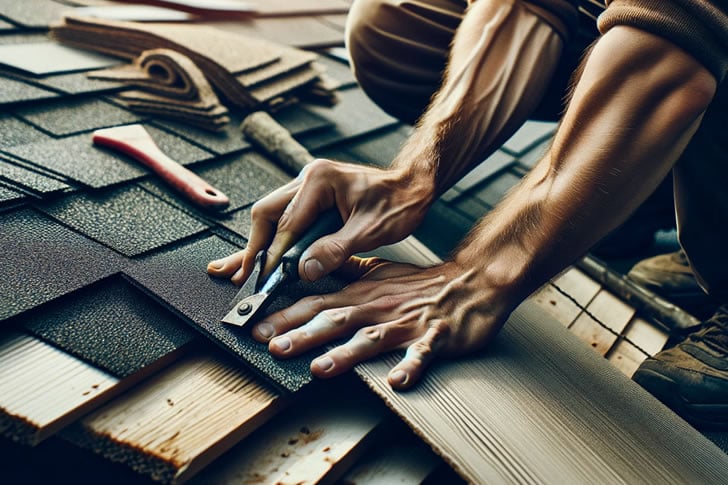Maintaining your home requires attention to essential aspects like your roof, your security systems, and your budget. This article provides practical advice on each of these key areas.

Your home is likely your most significant investment, and protecting it is crucial for your safety, comfort, and financial security. This guide will focus on three key areas: roof maintenance, home security, and budgeting tips to help you safeguard your home effectively.
Roof Maintenance
The roof is your home's first line of defense against the elements. Regular maintenance can extend its lifespan and prevent costly repairs. Here are some tips for maintaining your roof:
- Regular Inspections: Inspect your roof at least twice a year, preferably in the spring and fall. Look for signs of damage, such as missing or cracked shingles, rust spots on flashing, and moss or algae growth.
- Clean Gutters: Clogged gutters can lead to water damage and ice dams. Clean them regularly to ensure proper drainage.
- Trim Trees: Overhanging branches can damage your roof during storms. Trim trees to prevent contact with your roof.
- Check for Leaks: Inspect your attic for signs of water damage, such as stains or mold. Address any leaks promptly to prevent further damage.
- Professional Help: Consider hiring a professional roofing contractor for a thorough inspection and maintenance. They can identify potential issues and provide expert repairs.
- Replace When Necessary: If your roof is nearing the end of its lifespan (typically 20-30 years for asphalt shingles), consider replacing it to avoid major problems.
Home Security
Protecting your home from intruders is essential for your safety and peace of mind. Here are some tips to enhance your home security:
- Install a Security System: A home security system can deter burglars and alert you to potential threats. Choose a system that includes door and window sensors, motion detectors, and cameras.
- Secure Doors and Windows: Ensure all entry points are secure with strong locks and reinforced frames. Consider installing deadbolts and window locks.
- Lighting: Use outdoor lighting to illuminate dark areas around your home. Motion-activated lights can startle intruders and alert you to their presence.
- Smart Home Devices: Smart home devices, such as video doorbells and smart locks, can provide an extra layer of security. They allow you to monitor your home remotely and control access.
- Neighborhood Watch: Join or start a neighborhood watch program. Working together with your neighbors can help deter crime and keep your community safe.
- Regular Maintenance: Regularly check and maintain your security systems to ensure they are functioning correctly. Replace batteries and update software as needed.
Budgeting Tips
Protecting your home doesn't have to break the bank. Here are some budgeting tips to help you manage the costs of home maintenance and security:
- Create a Budget: Set aside a portion of your budget for home maintenance and security. Aim to save 1-3% of your home's value annually for repairs and upgrades.
- Prioritize Projects: Prioritize home projects based on necessity and potential impact. Address urgent repairs first, followed by preventive maintenance and upgrades.
- DIY When Possible: Some home maintenance tasks can be done yourself to save money. However, be cautious and only tackle projects within your skill level.
- Shop Around: Get multiple quotes from contractors and compare prices for materials. Look for sales and discounts on home improvement supplies.
- Insurance: Review your homeowners insurance policy to ensure you have adequate coverage. Consider adding endorsements for specific risks, such as floods or earthquakes.
- Energy Efficiency: Invest in energy-efficient appliances and upgrades to save money on utility bills. This can also increase your home's value.
Preventive Measures
Preventive measures can help you avoid costly repairs and enhance your home's security. Here are some additional tips:
- Water Damage Prevention: Inspect plumbing fixtures regularly for leaks and address any issues promptly. Consider installing a water leak detection system.
- Fire Safety: Install smoke detectors on every level of your home and test them regularly. Keep a fire extinguisher in an accessible location.
- Pest Control: Regular pest control can prevent infestations that can damage your home and pose health risks. Seal entry points and maintain a clean home to deter pests.
- Emergency Preparedness: Prepare an emergency kit with essential supplies, such as food, water, and first aid items. Have an emergency plan in place for natural disasters or other emergencies.
Conclusion
Protecting your home involves a combination of regular maintenance, security measures, and smart budgeting. By following these tips, you can safeguard your investment, ensure your safety, and maintain your home's value. Regular inspections, timely repairs, and proactive security measures can prevent major issues and provide peace of mind.
Investing time and resources in home protection is a wise decision that can save you money and stress in the long run. Whether you're a new homeowner or looking to enhance your existing home's security and maintenance, these tips can help you create a safe and comfortable living environment.









